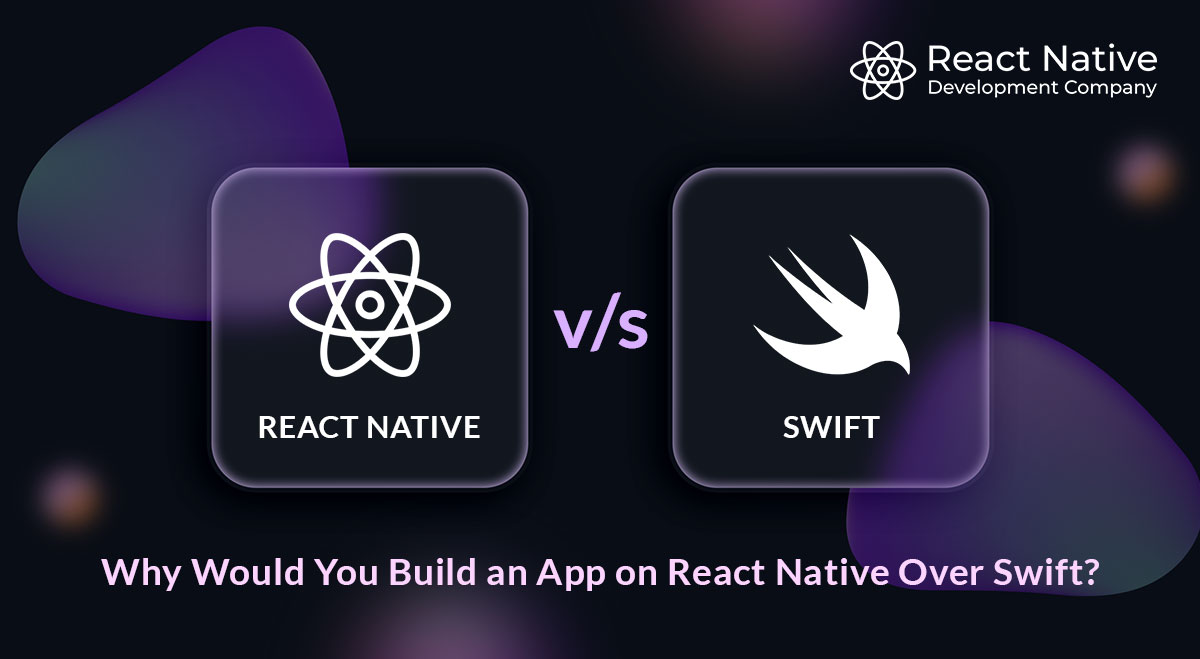
Why Would You Build An App On React Native Over Swift?
In the era of digitalization, where the number of mobile application users is increasing continuously, and as per Statista, by 2026, there will be 143 billion mobile application users.
From the total downloads, Android caters to 73% of the market, while only the IOS share is only 26%.

Statista
To cater to the whole audience, businesses require an extraordinary mobile application development platform that helps in creating and designing an advanced application that can run across multiple platforms.
There are a number of mobile development frameworks available for both platforms. Such as React Native which is a cross-platform mobile application development while Swift is specifically for IOS devices.
React Native is an open-source framework that works on JavaScript and Swift, a programming language that allows the creation of IOS applications.
Hereby, we will have a closer look at swift and React Native and discuss various advantages offered by React Native as compared to Swift app development for your app design and service offers by React Native to provide solutions for your every need.
Introducing to Cross-Platform Framework
Before having a closer look at both frameworks, firstly, let us know about the cross-platform framework
The cross-platform framework is used by react native developers to create apps on multiple platforms. It means that the application developed with the single code framework can work for Android and IOS devices. This helps developers work faster, more efficiently, and with supportable apps across different platforms.
Below are some of the features of the cross-platform framework
- Code reusability: With the help of the code reusability feature, developers can create a single code base and can use it to build apps for multiple operating systems.
- Less time: As the developers can use a single code base framework across multiple operating systems, it takes less time for the developers to launch the application in the market.
- Reduce Cost: A cross-platform framework reduces the cost of application development, as a single developer can create an application for multiple operating systems and simplifies the development process.
- Native Feel: The look and feel of cross-platform apps are similar to that of native apps. So that the user does not have to compromise on performance while using the cross-platform application
What is React Native? Does React Native have a future?
Reactive Native is an open-source Facebook-support framework for designing and developing a mobile application for both android and IOS devices.
Compared to the Swift framework, React Native has more components and community support. It is based on the JavaScript programming language, which allows the developers to reuse the code across various platforms such as Android and IOS and web apps.
Developers can reuse up to 70% of the code for building applications across various platforms, which reduces the time and cost of building mobile applications.
What Are Native Development Apps?
Native development apps mean creating a framework for a specific operating system. Developers use native interface elements tools to create apps. For instance, to create an apple application, developers use Swift or Object C, on the other hand, android apps are made with Java or Kotlin apps.
Below are some of the features of native application development
- Fast Performance: As a native application uses specific native tools for application development, it enhances the performance of the application
- Smooth hardware Integration: The native application uses specific react native tools, so they can easily integrate with device hardware features such as camera, GPS, Bluetooth, etc
- Quick Launch: Since the native application is created using a platform that uses system-specific tools, it makes it easy to launch apps without any bottleneck
- Smooth UI and UX: As developers use attractive tools and design to develop a native application, it enhances the user interface and user experience.
What is Swift? When should I use swift?
Swift is a general-purpose programming language created by Apple to build apps for IOS-powered ecosystems. With the help of this framework, apps can run on Watch IOS for apple watches, macOS for Apple computers, and many more.
The framework is currently using Apache License, which is just 8 years old. Before Apache, the company was using Object‑C for its app development.
The main goal of creating swift is to attract more developers to create applications for IOS devices. Leveraging the capabilities of the swift framework allows the developers to build more feature-rich and high-quality applications.
Why Are We Comparing React Native With Swift?
As we saw in the above figures the usage of mobile applications is increasing constantly, so now the mobile application is not merely a tool to solve problems, it has become more about creating a bond with the users.
If the brand application is installed in the user’s smartphone, then the brand will constantly stay under the user’s hand.
As per the IOC report, 80% of the users check their smartphones within 15 minutes after getting up. So for any business having a mobile application is a must.
For any business, sometimes the cost of developing applications across cross-platforms is too high.
If the cost of the application is reduced without losing the quality can be a huge advantage for companies.
In addition to that, businesses always look to cater to the audience of both platforms i.e. Android and IOS, so the company has to develop two separate platforms to perform the same task, which can be solved with the help of React Native app development.
Why React Native Is A Better Option For Mobile Application Development?
There are many factors that make React Native a better option to choose over Swift. Let us know about them
-
-
Performance
-
When we compare the performance of React Native to Swift, performance parameters come into consideration to decide which one is better. The parameters are based on memory usage, CPU consumption, and GPU speed.
Below are the performance comparison based on the following parameters.
| Performance | React Native | Swift |
| Memory Usage | Highly effective | In-effective |
| GPU Speed | Highly effective | In-effective |
| CPU Consumption | In-effective | Highly effective |
From the above result, we can see that Reactive Native development service performance is better than that of Swift, so performance-wise React Native is a better choice
Winner: React Native
-
-
Development
-
While developing an application, React Native takes less time to develop an application as compared to Swift, and also the development cycle is shorter. On the other hand, Swift has a slow process in developing an application and has a longer duration cycle.
Secondly, looking from the update point-of-view, the Swift framework does not provide OTA (Over-the-Air) updates and hence apple users will not get updates. While with React Native, you can see regular changes and enhancements in the application through regular updates
Maintenance of applications built with React Native can be easily done as compared to Swift because of the regular updates provided by React Native, so the project libraries and components are working with the latest version of the framework.
While from Swift’s perspective, as no updates are available, with no updates available, sometimes you may see a lag in the application so it becomes difficult to maintain the application.
| Development Process | React Native | Swift |
| Development Time | Fast | Slow |
| Development Cycle | Short | Long |
| OTA Updates | Available | Not-Available |
| Maintenance | Easy to Maintain | Difficult to Maintain |
Winner: React Native
-
-
Learning Curve
-
It is easy to learn and understand React Native if you know JavaScript. There are various fundamental courses available to understand JavaScript, so it becomes easy to develop a framework for mobile and web applications
Swift is a new programming language, so it becomes relatively difficult to understand Swift programming language as compared to React Native.
| Learning Curve | React Native | Swift |
| Complexity | Low | High |
Winner: React Native
-
-
Development Cost
-
When we compare React Native vs Swift for the cost of developing an application, React Native app takes relatively less costly to create an application than Swift development cost
| React Native | Swift | |
| Development Cost | Low | High |
Winner: React Native
-
-
Development Time
-
When it comes to development time, React Native development develops an application in less time for multiple platforms as compared to Swift. This is because of the complexity and takes more time to understand the programming language. So React Native is faster and easy.
| React Native | Swift | |
| Development Time | Less Time | More Time |
Winner: React Native
-
-
Maturity
-
Both the programming languages are new, as React Native was launched in 2015 ( direct descendent of React. Js which has been used inside Facebook since 2011) and Swift was launched in 2014.
Swift is used instead of Object — C programming language, which is always a thorny process. It is the backbone of every piece of software. On the other hand, React Native framework on JavaScript, so it becomes easy to check the code and detect the problems, and this framework makes it easy to spot the bugs and resolve them.
| React Native | Swift | |
| Maturity | Good | Bad |
Winner: React Native
-
-
Community Support and Documentation
-
React Native is an open-source framework that allows huge support from developers worldwide and on the other hand, Swift does not get that much support as compared to React Native Development. React Native has accurate, concise, and constant documentation support. Also, constant documentation update from Swift is helpful.
Read also: How does react native work?
| React Native | Swift | |
| Community Support | Good | Bad |
Winner: React Native
-
-
User Interface
-
Swift provides an advanced option when you want to develop graphic-intensive applications than React Native when using the application for IOS devices. While React Native interface performs better with android devices.
| React Native | Swift | |
| UI/UX | Good with Android | Good with Apple |
Winner: Tied
What Are Some Of The Popular Uses Cases: React Native Vs Swift
React Native — Uses Cases
-
-
- The framework is supported for almost each and every application
- Faster to develop and strong community support to build a stable application
- Easy to build applications with a reusable code system
-
Swift — Use Cases
-
-
- Suitable for premium apps with advanced security features
- The application continuously requires maintenance and provides updates in the long-term interval
-
Wrapping Up
Finally, from our comparison, you saw that React Native is a better pick. It is a cross-platform application, so you develop applications for both Android and IOS at the same time. With the help of React Native development services, you can build applications faster and cheaper than native apps.
Read also: What Will Be The Future Of React Native Developers In 2023?
As compared to Swift which does not provide updates, React Native will provide you with regular updates, which makes it easier for fixing bugs and errors across all platforms.
So if you are wondering if React Native suits best for your project, then get in touch with React Native app development company to build the best-performing mobile apps.
Frequently Asked Questions
Yes, of course. Over 38% of mobile app developers and React Native app development company leans towards React Native for mobile app development.
You should choose Swift over React Native when your mobile app will be using native iOS functions like Siri and Apple Maps. This is because, in cross-platform apps, the use of native iOS functions would be limited.
